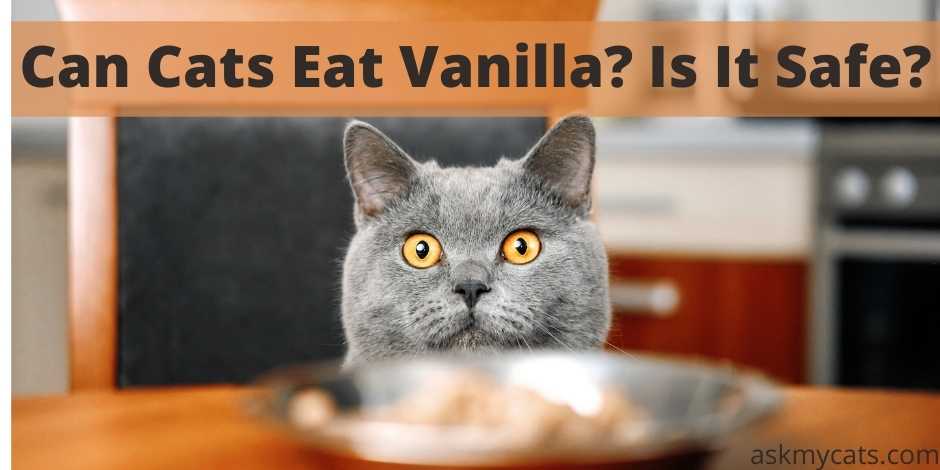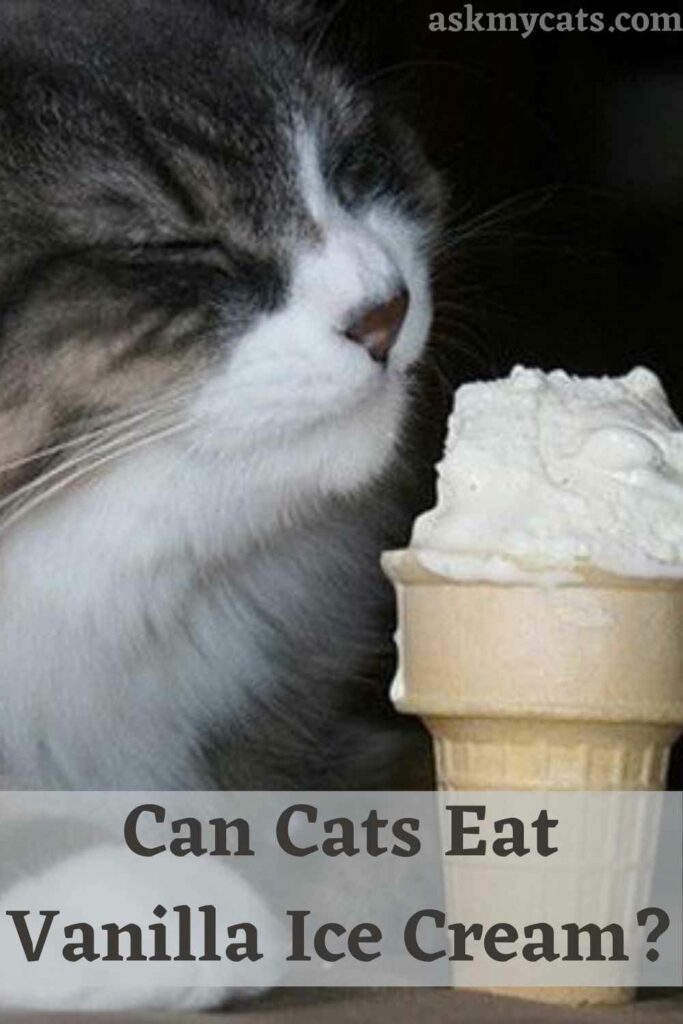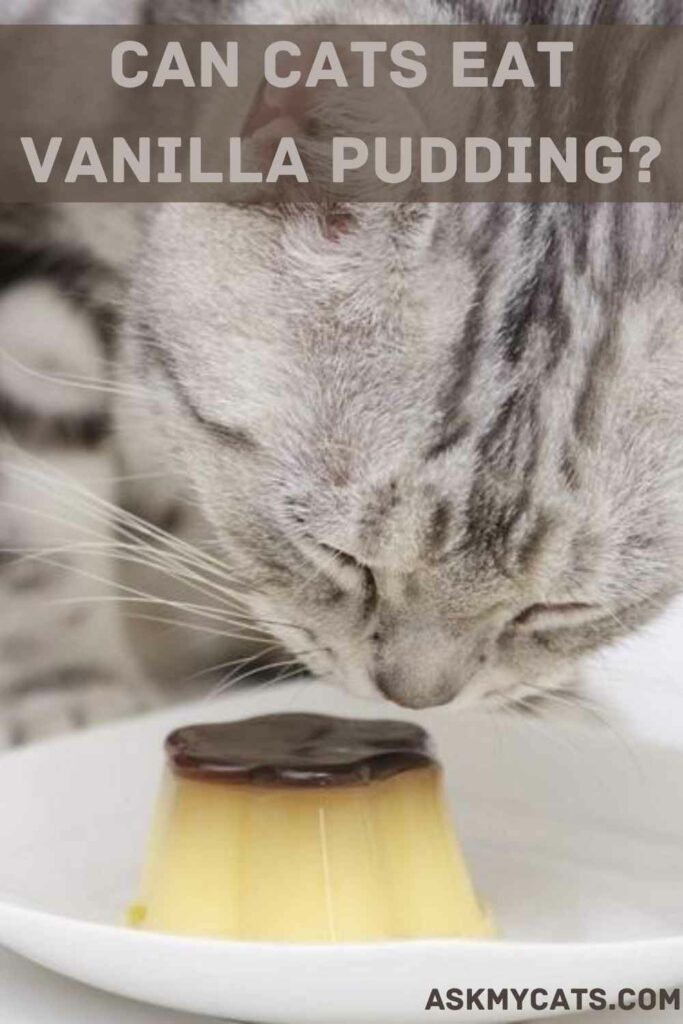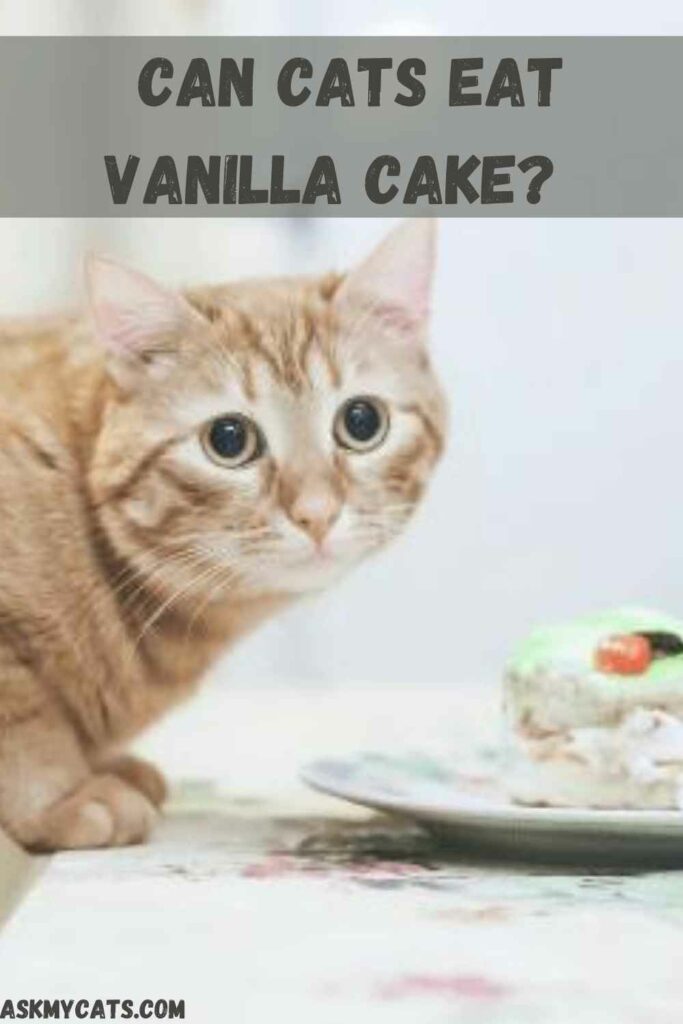Cats have a habit of sticking their nose in everything and vanilla is a very common ingredient that can be found in almost any pantry or closet, it’s likely that your cat has come across it.
Can cats eat vanilla? There isn’t a simple answer to this. While vanilla in things is unlikely to harm your cat, the ‘thing’ itself may be harmful if it contains too much sugar, for example. Straight vanilla can be troublesome. Thankfully, it is unlikely to attract your cat. In brief, vanilla and vanilla-flavored pudding or dessert should be avoided by your cat.
However, there are few things containing vanilla that can be eaten safely by your cat.
This article will tell you all about the foods containing vanilla that should be avoided by your cat and foods containing vanilla that are safe to eat for your cat.


Give Your Cat the Perfect Day
Get the Free Ebook!
Can Cats Smell Vanilla?
Yes, cats can smell vanilla whether they like the smell of vanilla or not depends upon the cat.
The vanilla aroma is neither on the list of popular scents that cats despise nor on the list of scents that cats prefer.
Eating vanilla ice cream or vanilla yogurt will reveal this. Try to check whether your cat is purring and walking about when you are eating it. If yes, then your cat likes the scent of vanilla.
Can Cats Eat Vanilla Ice Cream?
Yes, cats can eat vanilla ice cream as it is not toxic to them, but only 1-2 spoons, because it has milk, and most cats, are lactose intolerant.

Vanilla ice cream isn’t hazardous to cats in general, so they can consume a spoonful or two.
However, because ice cream contains milk, your cat may have stomach trouble if it is lactose intolerant.
If you want to share, keep the ice cream to a spoon, and don’t go over that.
Cats, on the other hand, lack the enzymes required to digest lactose. As a result, any lactose-containing product, such as ice cream, can be harmful to them.
Furthermore, ice cream is far too sugary to cause long-term issues.
If your cat is lactose intolerant, eating ice cream can cause an upset stomach or diarrhea.
If your pet consumes a large amount of it, diarrhea may develop.
Another point to consider is the sweetener. Sugar, albeit the most common sweetener, is ineffective for cats. Sugar levels in your pet’s blood will only rise as a result of the sweetener.
It’s not healthy for cats to eat as many sugary goodies as people do. As a result, stay away from it as much as possible.
Another possibility is that the ice cream contains xylitol, which is toxic to cats. Sugar-free products frequently contain xylitol. It acts as a sugar substitute, and while it is safe for humans, it is not safe for our cats.
Also, chek out can cats have ice cream
Can Cats Eat Vanilla Yogurt?
Yes, cats can eat vanilla yogurt but only if it is free of ethyl alcohol it can be given on an occasional basis as it contains sugar which is hazardous to cats.
Yogurt can be added to your cat’s food and supplements on an occasional basis. However, the yogurt you give your cat must be basic and unsweetened; sugar is extremely toxic to cats since they can’t digest it correctly.
To restate, if you do want to serve yogurt to your cat, make sure it is unflavoured and free of added sugar. Plain, unsweetened yogurt is the sole option.
On paper, this type can help provide a nutritious, balanced diet and promote your cat’s health by providing benefits such as a vitamin A supplement, potassium, calcium, and magnesium supplement Strengthened immune systems Reducing allergies Probiotic-based yogurt can also alleviate diarrhea
With all of this in mind, make sure to only serve yogurt to cats, not kittens. While kittens enjoy the benefits of milk, their delicate and sensitive tummies can have a negative reaction to yogurt, even plain yogurt.
Yogurt has no nutritional value for kittens, who will obtain their nutrients through milk.
Is Vanilla Yogurt Safe For Cats?
Yes, if vanilla yogurt only is free of ethanol it is usually safe for cats if given occasionally but it must be unsweetened.
Because adult cats are carnivores and lactose intolerant, it’s crucial not to feed them too much milk on a daily basis. Lactic acid accumulation can cause a variety of health problems.
Although milk, cream, and other dairy products are commonly thought to be a fantastic treat for cats, it’s vital not to overuse them because adult cats can’t digest them.
This is because as kittens are weaned off their mothers’ milk and learn to prefer solid meals, their bodies stop generating the enzyme that allows them to digest dairy, resulting in the majority of felines developing a dairy intolerance by the time they reach adulthood.
You’ll notice side effects like diarrhea, vomiting, or an upset stomach if your cat has lactose intolerance symptoms. Similarly, if you feed your cat too much yogurt, they may experience stomach discomfort and digestive issues.
Can Cats Eat Vanilla Pudding?
No, cats cannot eat vanilla pudding as it contains sugar, milk, butter, salt, and eggs which can be harmful to your cat’s health.

Vanilla pudding is inedible to cats. Vanilla pudding contains ingredients such as milk, sugar, butter, eggs, salt, and corn starch, which can be harmful to a cat’s health if consumed in significant quantities.
Ethyl poisoning can occur in cats as a result of the vanilla extract in the pudding.
The fact that vanilla pudding contains toxic components is the main reason why cats cannot eat it.
While vanilla pudding may appear to be a healthy food for your cat, it can make them sick and create serious health problems.
In vanilla puddings, whole milk is commonly used. Whole milk, unfortunately, is not good for cats.
Despite its cultural acceptance, cats should not be given milk in the first place.
Lactose intolerance affects the majority of cats. That means they can’t digest lactose, which can cause a variety of problems in cats. Sickness, vomiting, diarrhea, cramps, and extreme dehydration are all examples of this.
Although cats are unable to detect sweetness, this does not negate the fact that it has a negative influence on them.
While sugar is not harmful to cats, it can be dangerous if ingested in high quantities. Sugar contains a lot of carbs, which cats require in little amounts.
While most pet foods have a little bit of sugar in them, vanilla pudding does not. The sugar in most vanilla pudding recipes ranges from 1/3 cup to 1/2 cup. That’s a lot of sugar for a cat to devour, even in a small slice of vanilla pudding.
Butter should be avoided by cats for the most part. While it isn’t poisonous to them, too much of it can cause problems. Butter is fat, and cats only require a small quantity each day to keep healthy.
Although butter is a crucial element in vanilla puddings, it has little nutritional value for cats. A tablespoon of butter is used in most recipes.
While this may not seem like much, it’s enough to cause problems for your cats, such as Upset Stomach, Dehydration, and Vomiting.
Cornstarch has a distinct effect on cats than the other elements in vanilla pudding. Corn is not a significant allergy source in cats. While cats have fewer allergic reactions to this than humans, it still has a significant influence.
Cornstarch is present in many cats’ feeds, but not in the amounts found in vanilla pudding. In addition, unlike vanilla pudding, cornstarch is frequently baked into those foods rather than merely stirred in.
Based on what we’ve learned about vanilla pudding so far, it’s evident that it’s a food you should never share with a cat. It’s simply too risky to give them, and it’s not healthy for them.
While some of the ingredients have nutritional value for cats, when combined with the negative ones, vanilla pudding is something you shouldn’t serve to your cat.
Can Cats Drink Vanilla Extract?
No, a cat cannot drink vanilla extract as it has ethyl alcohol which can cause alcohol poisoning.
Ethyl alcohol is present in large concentrations in vanilla extract, up to 34% in some cases.
In cats, this can result in alcohol poisoning. Cats can suffer from liver failure, a slow heart rate, and cell damage in addition to alcohol poisoning.
If your cat gets ethyl poisoning from vanilla essence, you should expect to observe signs right away if they were already hungry.
You may notice increased urination, nervous system slowing, poor reflexes, or even a heart attack within the first 15 minutes.
Does Vanilla Extract Calm Cats?
Yes, vanilla extract can calm cats but only in very specific situations.
When you return home from the vet with one of your cats in a multi-cat household, you may have some behavioral issues. There may be some tension when they reintegrate because that cat now smells like the vet and your other cats smell like home.
To aid with this integration, place a teeny-tiny drop of vanilla extract at the base of each cat’s tail – this will ensure that they all smell the same when they meet!
You may also get the same effect by rubbing a shirt that smells like you over the backs of all your cats.
Can Cats Eat Vanilla Cake?
Cats can eat vanilla cake but only in moderation as it could prove harmful if taken in large quantities.

Vanilla Cake is a popular dessert that is enjoyed by a large number of people.
It should come as no surprise that your cat enjoys the taste of the vanilla cake as well.
You should, however, give it to her in moderation.
A tiny portion should suffice. Because your cat doesn’t need all that sugar and calories, you should avoid giving her an entire piece.
Always check the ingredients of the cake and make sure that ethyl alcohol is not present as it could give you cat alcohol poisoning.
Vanilla extract has high levels of ethyl alcohol, up to 34 percent in some situations. This can cause alcohol toxicity in cats.
In addition to alcohol poisoning, cats can develop liver failure, a sluggish heart rate, and cell damage.
Frequently Asked Questions
Are all dairy products harmful to cats?
Ans. No, all dairy products are not harmful to cats if given in moderation. Cats become lactose intolerant as they grow. Lactose intolerance affects the majority of cats. That means they can’t digest lactose, which can cause a variety of problems in cats. Sickness, vomiting, diarrhea, cramps, and extreme dehydration are all examples of this.
Can an overdose of vanilla ice cream kill my cat?
Ans. It is unlikely for a cat to die from an overdose of vanilla ice cream. Of course, if your pet consumes more than a few spoonfuls of vanilla ice cream, the level of problems will increase. It shouldn’t, however, be the primary cause of their mortality. Now, just because vanilla ice cream isn’t going to kill your cat doesn’t mean you can feed it as much as you like. Vanilla ice cream should only be given as a special treat to your pet and not as a regular part of his or her diet.
Can cats eat Blackberry yogurt?
Ans. Because many blackberry yogurts contain added sugars and flavorings, the easiest way to give your cat blackberry yogurt is to mix fresh blackberries into plain Greek yogurt.
Final Words
In any case, we don’t recommend feeding vanilla to your cat. Because of the high alcohol level, you run the risk of giving your cat alcohol poisoning, and most cats aren’t interested in it anyhow.
Vanilla in baked goods is harmless enough, but you’re still dealing with high sugar content. In any case, it’s advisable to keep vanilla away from your cat in favor of far safer foods.
